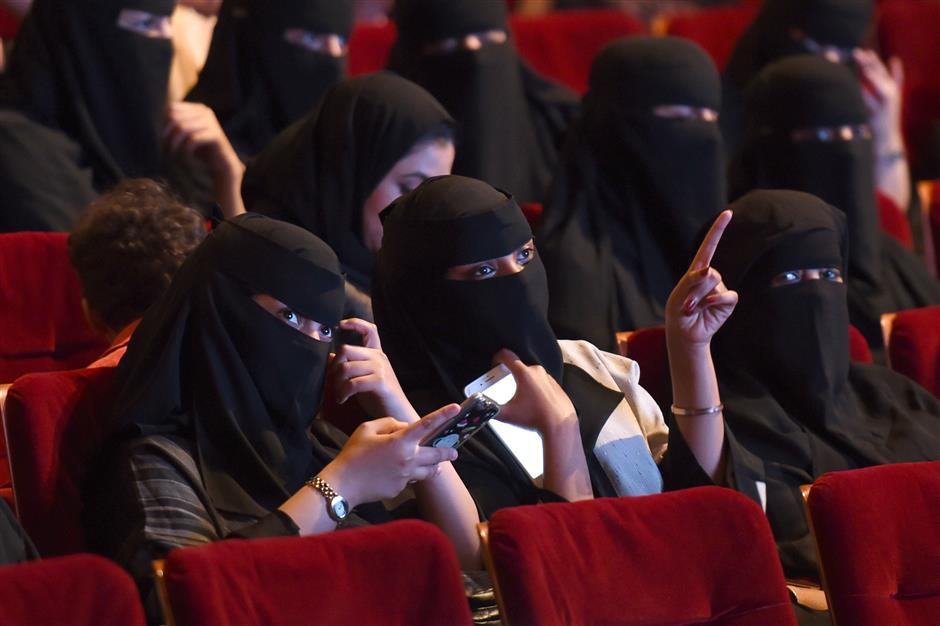Cinemas will open in Saudi Arabia next year for first time in decades

This file photo taken on October 20, 2017 shows Saudi women attending the "Short Film Competition 2" festival at King Fahad Culture Center in Riyadh. Saudi Arabia on Monday announced a lifting of the kingdom's decades-long ban on cinemas, a landmark decision part of a series of social reforms ushered in by the powerful crown prince.
Saudi Arabia will allow movie theaters to open in the kingdom next year, for the first time in more than 35 years, in the latest social push by the country’s young crown prince, Riyadh announced on Monday.
It is the latest stark reversal in a kingdom where movie theaters were shut down in the 1980s during a wave of ultraconservatism. Many Saudi clerics view Western movies and even Arabic films made in Egypt and Lebanon as sinful.
Riyadh said the opening of movie theaters would contribute more than 90 billion riyals (US$24 billion) to the economy and create more than 30,000 jobs by 2030. It said there would be 300 cinemas with about 2,000 screens built in the country by 2030.
Despite decades of ultraconservative dogma, Crown Prince Mohammed bin Salman has sought to enact several major social reforms with support from his father, King Salman.
The crown prince is behind measures such as lifting a ban on women driving next year and bringing back concerts and other forms of entertainment to satiate the desires of young Saudis, who make up the majority of the population.
The social push of the 32-year-old crown prince is part of his so-called Vision 2030, a blueprint for the country that aims to boost local spending and create jobs amid sustained lower oil prices.
Yesterday’s announcement said a resolution was passed, paving the way for licenses to be granted to commercial movie theaters, with the first cinemas expected to open next March.
Many Saudis took to Twitter to express their joy at the news, posting images of buckets of movie theater popcorn and moving graphics of people dancing, fainting and crying.
“It’s spectacular news. We are in a state of shock,” said Saudi actor and producer Hisham Fageeh.
He starred in and co-produced the Saudi film “Barakah Meets Barakah” by director Mahmoud Sabbagh, which premiered at the Berlin International Film Festival in February.
The film, which has been called the kingdom’s first romantic comedy, tells the story of a civil servant who falls for a Saudi girl whose Instagram posts have made her a local celebrity.
“We are essentially pioneers because we all took risks to work in this industry,” said Fageeh. “We were super lucky, because luck is always a factor of whether we make it or not.”
Even with the decades-long ban on movie theaters, Saudi filmmakers and movie buffs were able to circumvent traditional censors by streaming movies online and watching films on satellite television. Many also travel to neighboring countries such as Bahrain and the United Arab Emirates to watch movies at theaters.
Despite Saudi Arabia’s lack of movie theaters, young Saudi filmmakers have received government support and recognition in recent years.
The government has backed a Saudi film festival that has been taking place for the past few years in the eastern city of Dhahran. This year, some 60 Saudi films were screened.
The film “Wadjda” made history in 2013 by becoming the first Academy Award entry for Saudi Arabia, although it was not nominated for the Oscars.
The movie follows the story of a 10-year-old girl who dreams of having a bicycle, just like boys have in her ultraconservative neighborhood where men and women are strictly segregated and where boys and girls attend separate schools.















